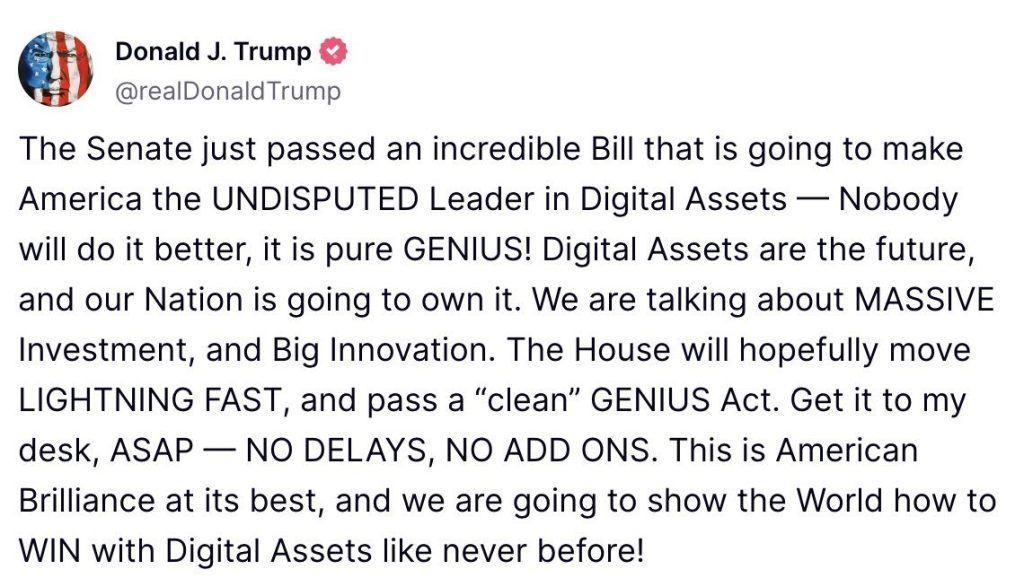Trump’s Urgent Call to Action: The GENIUS Act’s Path Forward
In a bold call to action, US President Donald Trump is urging the House of Representatives to act swiftly on the GENIUS Act, a groundbreaking piece of legislation he wants passed without any amendments. In a recent post on Truth Social, Trump expressed his elation over the bill’s approval in the Senate and stressed the need for immediate action, stating, “Get it to my desk, ASAP — NO DELAYS, NO ADD ONS.” His statement highlights his belief that this piece of legislation will position America as the unmatched leader in the world of digital assets.
This influential bill, formally known as the Guiding and Establishing National Innovation for US Stablecoins Act, was recently passed by the Senate with a significant majority, receiving a 68 to 30 vote. Notably, 18 Democrats joined the bulk of Republican senators in supporting the proposed regulations aimed at stablecoins—digital currencies pegged to the US dollar.

Source: Truth Social/@realDonaldTrump
Why This Matters: The Regulatory Landscape Shifts
The introduction of the GENIUS Act signifies a pivotal moment in the regulatory framework surrounding cryptocurrency in the United States. As the first comprehensive attempt to establish regulation over stablecoins, this bill seeks to ensure that the burgeoning digital asset market is not only innovative but also secure and transparent for consumers.
Supporters argue that without a defined regulatory structure, the US risks falling behind other nations that are moving swiftly to embrace digital currencies within their financial systems. The urgency felt by lawmakers, including Senator Mark Warner, stems from the understanding that as global policies on digital assets evolve, the United States must not be left behind.
Unpacking the GENIUS Act: Key Features and Controversies
Should the House adopt the GENIUS Act, it will introduce a federal licensing framework for stablecoin issuers, mandating that every token is fully backed on a 1:1 basis by US dollars. Additionally, it imposes strict guidelines regarding reserve utilization, confining these funds to redemption purposes and low-risk investments, such as treasury repos. Consumer protection is also a focal point of the bill, requiring anti-money laundering checks to safeguard users.
However, the bill is not without its critics. While it prohibits members of Congress and their immediate families from benefiting financially from stablecoins, it notably exempts the president and his family from these restrictions. This glaring inconsistency raises questions about conflicts of interest and the integrity of oversight.
Expert Opinions: Analysts Weigh In
Industry experts have expressed a mixed response to the GENIUS Act. Some view it as a well-intentioned but flawed approach to regulation, arguing that it could stifle innovation in the crypto space. “While regulation is necessary, it is essential that it fosters growth rather than hinders it,” one analyst noted. The bill’s ban on yield-bearing stablecoins, perceived by some as a protective move for traditional banks, could ultimately hinder the kind of innovation that could benefit users.
Furthermore, the stringent compliance requirements may disproportionately affect smaller stablecoin issuers, consolidating power within a few large entities and limiting competition in an already rapidly evolving market.
Future Outlook: What Lies Ahead for Cryptocurrency Regulation
With the GENIUS Act making its way to the House of Representatives, the future of cryptocurrency regulation in America hangs in the balance. Trump’s push for rapid passage could expedite the establishment of a regulatory framework, but partisanship could slow this momentum. As discussions continue, the implications of this bill could reshape not only the landscape of stablecoins but the entire cryptocurrency market in the US.
Should the House approve this legislation, it will journey to President Trump for final approval, cementing a new era for digital assets. The bill’s success or failure may also set the tone for future regulatory measures, either encouraging innovation and growth or imposing constraints that could stifle the very advancements that lawmakers seek to promote.
Conclusion: Join the Conversation
As the debate on the GENIUS Act unfolds, the stakes could not be higher for the cryptocurrency community. How do you see the implications of this legislation affecting the future of digital assets? Will it provide the clarity and security that the market needs or complicate the landscape further? Share your thoughts below and engage in the discussion about the upcoming transformation within the digital asset space.

